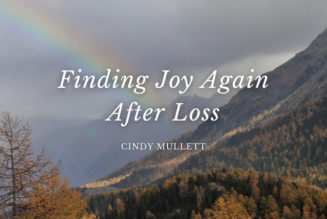
“You’ve shown me that even my mistakes and sins can be recycled into something good—through Your transforming grace.”
– Jesus Listens,April 12th
Some experiences from our teenage years we can remember as if they had happened yesterday. I still remember with stunning clarity the day I learned a powerful lesson about grace.
I was working my first job over the Christmas holiday season at a local department store in the gift-wrapping department. For some reason, I was running late. I rushed around the house getting everything together and jumped in my car. I quickly put the car in reverse and backed out.
Immediately, I felt the impact and heard the crash.
In my hurry, I had completely forgotten to open the garage door. As I got out of my car and assessed the damage, my mom came rushing outside because she had heard the noise. She looked at what had happened and told me, “I know you’re late. Go ahead and take my car to work. I’ll tell your dad.”
I took her keys and went to work, feeling horribly about what I had done. I could tell from the look of things that I had completely destroyed the garage door. It would need a full replacement. And, in the meantime, I had no idea how I would even be able to get my car out of the garage.
By the time I came home that evening, I saw my car sitting in the driveway. Somehow, my dad had gotten the car out so that I’d be able to use it. When I came into the house, he met my embarrassed apology with a smile and said, with compassion, “Girl, how on earth did that happen?”
Neither he nor my mom ever once lectured me about my mistake. They didn’t give me a long list of things I could have done better to avoid crashing into the garage door. They didn’t berate me for being in a hurry. They never once complained about how much it cost to replace the door.
Instead, they gave me grace. They looked at me and showed me compassion and understanding. They knew I wasn’t typically late, that I didn’t mean to destroy the door, and that I was so sorry for what I had done. When I felt so badly about my mistake, they met me with loving acceptance.
Can I tell you something about that incident? It still makes me tear up right now to think about it. I still feel overwhelmed by how much love I felt from both of my parents in the midst of my mistake. My mom showed such wisdom by understanding in the heat of the moment what needed to happen first—she gave me her car and let me get to work. It probably was inconvenient for her in ways I’ve never even heard about, because she never complained about it.
My dad must have spent extra hours figuring out how to get my car out of the garage, and then more hours getting the garage door fixed. And rather than lecture me or scold me, my parents graciously covered my mistake. And now, we still laugh about the time I drove the car through the garage door. Amazingly, it’s not a negative memory from my teenage years, but a positive one. My parents’ response makes it one of the most defining memories of their love for me. When our kids fail, it’s not just a situation to deal with or a problem to solve. It’s an opportunity to teach our children about God’s grace in a powerful way.
You may have had parents who would have handled a situation like that in a very different way. There may have been yelling, anger, or harsh words. You may recall those types of memories not with fondness, but with shame. We can’t change the way our parents met our failures, but we can thoughtfully consider how we respond to our teens’ failures.
We begin by teaching the concept of grace to our teens as we study the Word together. It’s a primary Christian doctrine—we are saved by “grace alone”—and the Word sets the foundation for their understanding. However, this knowledge comes alive in a profound way as they experience grace in the home. A teen’s understanding of God is indelibly shaped by the example of their parents. When our kids fail, it’s not just a situation to deal with or a problem to solve. It’s an opportunity to teach our children about God’s grace in a powerful way.
In the midst of our everyday interactions with our kids, some of the most important lessons are being conveyed through how we respond to their failures and successes. These seemingly insignificant interactions profoundly impact your teen.
Parenting with Hope. Copyright © 2024 Melissa B. Kruger. Published by Harvest House Publishers, Eugene, Oregon 97408. www.harvesthousepublishers.com
About The Author

Melissa B. Kruger serves as Vice President of Discipleship Programming at The Gospel Coalition. She regularly teaches women in her community and speaks at conferences around the country. Her latest book is Parenting with Hope: Raising Teens for Christ in a Secular Age. She is the wife of Michael J. Kruger, president and professor of New Testament at Reformed Theological Seminary-Charlotte. Together they have three young adult children.









